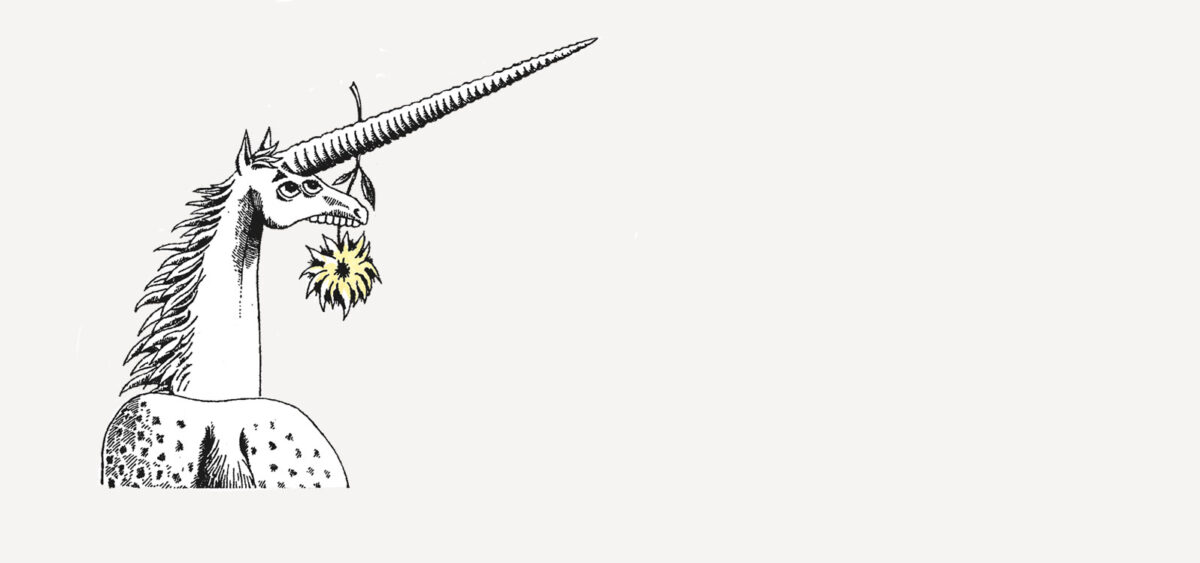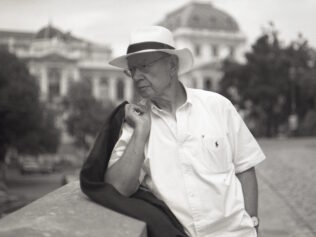
Just when humanity invented technology that allows us to acquire certain, truthful knowledge and to share it easily, a sudden change of direction has taken place. We’re turning away from facts to float on a wave of disinformation and often mistaken intuition. It’s not clear whether the truth still means anything. Nor how to distinguish lies from irony or fiction.
A man with his hair in a distinctive side parting and a reddened angry face stretches out a pointing finger and declares with a frown: “Fake news!” This slogan quickly became an irreverent (or hateful) way to silence adversaries – just how fake news itself has become an element of jokes, but is simultaneously a phenomenon that is seriously and in a real way disintegrating our world.
Many different varieties of T-shirt depicting Donald Trump proclaiming his trademark expression are available to buy, and it’s this image of the president that will be the most enduring memento of his political career – in a time when Mr Trump will no longer be news.
In the meantime, it remains symbolic of this era in which we’re turning our backs on factual events and proof, and looking doe-eyed at misleading, mendacious or nonsensical content. The robots that spin the global drum of news entertainment (which includes news and all sorts of rubbish, cynical lies, mistakes, jokes and propaganda) serve the interests of money. If you’re wondering how on earth it took us just a few years to cross into the post-truth sphere where nothing is certain, then the mechanism underlying this switch is relatively simple. For centuries, bad and sensational news stories have allowed newspapers, radio and TV stations to grab attention and attract advertisers. With internet media, the new currency is clicks and the time spent in a given section of the virtual universe. Absurd stories – so stupid, funny or astonishing that they’re simply hard to believe – knock us off balance and force us to give them a click. It turns out that they’re a very effective way of rousing us and triggering reactions. Every visit to a website brings with it money and the display of advertising material. Every time some weird news is shared, the stakes are raised. Truth and falsehood are for sale, and we are the travelling salesmen.
Honesty doesn’t pay
While fake news is simply the younger sibling of the gossip, political manipulation and disinformation spread by intelligence agencies or business competitors, its current profitability is incomparable to anything seen to date. Its high market value reveals its significance – it is dangerous.
Journalists at the Guardian have highlighted several examples of clear and relatively straightforward contradictions of the facts. In Brazil, as it grapples with a high number of COVID-19 infections and deaths, false information according to which coffins in cemeteries are filled not with bodies but with stones, is spreading just as fast as the virus. In Mexico, fake news alleges that drones are spraying the coronavirus over native tribes. In the US, the president has claimed that hydroxychloroquine is an effective treatment for COVID-19, despite innumerable research groups saying it is not advised for the illness and that taking it entails a significant risk. Brazilian president Jair Bolsonaro has also publicly stated that the drug works (both presidents are now under close scrutiny from Twitter, which removes false content from their accounts). In Argentina, ‘information’ is widely shared that citizens are being deliberately infected by the CIA. And Peruvians are sharing news that seawater and lemongrass growing in Venezuela are miracle cures for the coronavirus. The BBC has reported at least one case of severe poisoning in a Latin American family that drank bleach because they believed claims that it protects against infection. In India, WhatsApp has been used to accuse Muslims praying at a Sufi tomb in Delhi of swearing an oath to purposefully infect Hindus. Those lies spread fast, culminating in actual discrimination: lynch attacks and unjustified arrests.
The magma-like nature of fake news, its blurred borders and constantly renewed forms are all concerning. Even intelligent, well-read people who are used to distinguishing the character of news items can be taken in by their twisted logic. And yet fake news was originally a type of joke – a satirical kind of ‘anti-news’, mocking the conventional methods used by traditional media outlets. This was the sort of perverse and ironic strategy adopted by, among others, the American magazine The Onion in the 1990s, cleverly mixing true information with absurdity and jokes. Other subversive sites have also adopted a similar approach, imitating the appearance, language and layout of other websites. These somewhat smart ideas, which in any case created a useful sense of unrest, were soon ‘seized’ by cynics whose objective was profit. And so today we have a whole army of sites and services that only appear to be serious, credible media, and that create havoc and rake in money.
Word of the Year
When considering this phenomenon, two of the most important questions that arise are: What changes in a person who regularly comes into contact with falsehood? And what will happen to our species when it cuts ties with reality for good? This is not a task for philosophers – they have long established the non-existence of objective truth, which we replace with individual projections.
It seems like visionaries or science-fiction writers are best equipped to deal with the surrealism of fake news. We urgently need someone who can warp our already severely deformed world in order to create a fiction that presents our true reflection. It may seem paradoxical but not impossible that given the multi-layered complication of everything that is happening or not happening, the best strategy might be to switch on our imaginations. What will give us better knowledge of the world: an evening spent trying to sieve grains of truth from nonsense, or one spent reading a novel?
2016 was a turning point in our relations with the truth. No fewer than three committees of dictionary experts highlighted an essential change occurring in language. The Oxford Dictionary declared its word of the year to be ‘post-truth’ – that is, the term used to describe “circumstances in which objective facts are less influential in shaping public opinion than appeals to emotion and personal belief.” In 2016 in the UK, the word was used 200% more frequently than just one year earlier.
According to the writers of the respected American dictionary Merriam-Webster, 2016 belonged to the concept of ‘surreal’, the use of which was already on the increase following shocking, tragic or catastrophic events. This time, the trigger for the unprecedented vitality of the word was, indeed, the victory of Donald Trump in the presidential elections. It happened contrary to all predictions made by the dominant media corporations in the US. For many of us, the triumph of a man whose biography and behaviour alone seemed absurd meant widening the scope of what we considered to be probable. When we say, “I can’t believe it”, what we mean is that it’s hard for our system of values to accept and agree to a certain fact.
The Trump case is interesting because it concerns a man who constantly shifts norms and intensifies his own absurdity. And on top of that, one who surreally inverts roles. Trump is a walking fake-news agency, whether it be online or in press conferences, and at the same time accuses all his adversaries of being deceitful and like one big joke.
This extreme approach, which is not unique to the President of the United States – take, for instance, believers of the flat Earth theory – clearly illustrates the ever-increasing scope of the term ‘fake news’. The Trumpian philosophy dictates that we can reject any knowledge or argument with which we disagree. The truth is what I decide to be true; I can ignore any source and promote any other. The authenticity and factuality of information has lost its power.
For this reason, the Australian Macquarie Dictionary declared fake news to be the most important concept of 2016, saying that its widespread use indicated “an evolution in the creation of deceptive content” and that “people were beginning to believe what they wanted.”
A matter of imagination
Severe difficulty in differentiating truth from lies may be a symptom of many psychological disorders. With that in mind, it’s worth asking if we’re not experiencing a case of collective madness – all over the world, we’re giving in to an orgy of thoughtless clicking and sharing of nonsensical texts, memes and video clips, paying ever less attention to true events and their consequences. In a world of advanced mediatization and fictionalization, one source of hope – alongside imagination and treatment – may actually be words themselves. More specifically, restoring their proper meanings.
In early 2017, Ursula K. Le Guin, the brilliant American writer who spent her life unjustly categorized as a science-fiction writer (she died in 2018) and therefore as someone not dealing in reality, sent a letter to the editors of The Oregonian magazine. In it, she protested against another concept with very close ties to the rise of fake news. Her letter was about the term ‘alternative facts’ – a term used by politicians. Le Guin, a master of words and literary precision, and creator of many alternative civilizations and cultures in her prize-winning works, took the opportunity to tidy up the refurnished dictionary of the present day. She wrote:
“We fiction writers make up stuff. Some of it clearly impossible, some of it realistic, but none of it real – all invented, imagined – and we call it fiction because it isn’t fact. We may call some of it ‘alternative history’ or ‘an alternate universe’, but make absolutely no pretense that our fictions are ‘alternative facts.’
“Facts aren’t all that easy to come by. Honest scientists and journalists, among others, spend a lot of time trying to make sure of them. The test of a fact is that it simply is so – it has no ‘alternative’. The sun rises in the east. To pretend the sun can rise in the west is a fiction, to claim that it does so as fact (or ‘alternative fact’) is a lie.
“A lie is a non-fact deliberately told as fact. Lies are told in order to reassure oneself, or to fool, or scare, or manipulate others. Santa Claus is a fiction. He’s harmless. Lies are seldom completely harmless, and often very dangerous. In most times, most places, by most people, liars are considered contemptible.”
We’re living in the season of leniency. The clearest sign of this is that we’ve agreed to call lies ‘fake news’.
In one of her most famous books, The Left Hand of Darkness, Ursula Le Guin wrote that truth is a matter of imagination. She compared facts to pearls lying at the bottom of the ocean. Their fate depends on how they are told. Depending on who uses a fact, it may become a gem or it can turn to dust.
The internet is not a no-man’s-land. So much of it depends on us.
Translated from the Polish by Zosia Krasodomska-Jones









